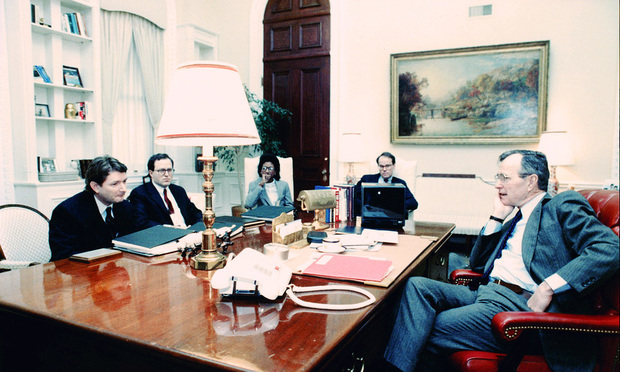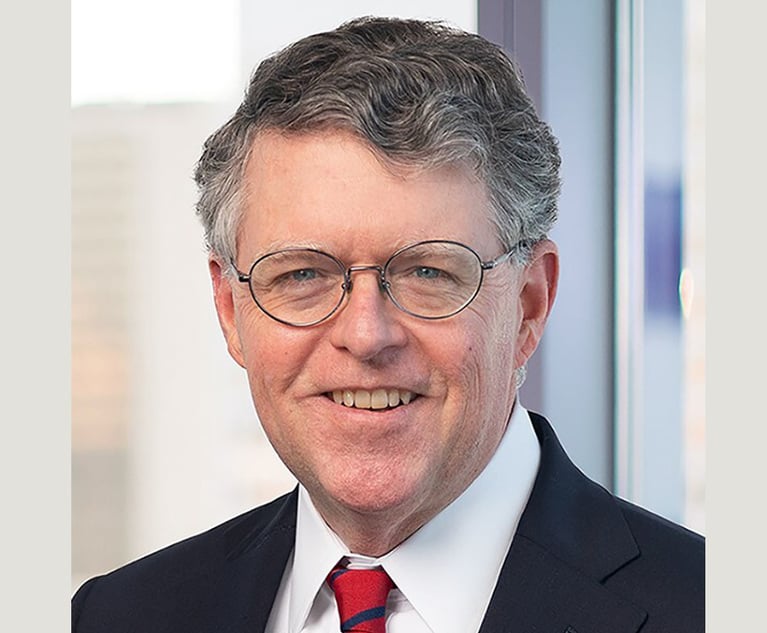Why George H.W. Bush Was a Model Client
I will always remember and cherish the week I got to spend with the then-vice president in January 1988.
December 14, 2018 at 12:54 PM
5 minute read
 Vice President George H.W. Bush (right)'s Iran-Contra Independent Counsel Deposition, held Jan. 11, 1988, in Room 180 of the Eisenhower Executive Office Building in Washington, D.C. Pictured are Paula Boggs, third from right, William B. Lytton, second from right, Clifford Sloan, second from left, and K. Chris Todd, left, with the Office of Independent Counsel. Official White House Photo
Vice President George H.W. Bush (right)'s Iran-Contra Independent Counsel Deposition, held Jan. 11, 1988, in Room 180 of the Eisenhower Executive Office Building in Washington, D.C. Pictured are Paula Boggs, third from right, William B. Lytton, second from right, Clifford Sloan, second from left, and K. Chris Todd, left, with the Office of Independent Counsel. Official White House Photo
Since the death of George H.W. Bush on Nov. 30, 2018, many have eulogized him. A patrician World War II hero, Bush spent much of his adult life in public service. He represents an era and a style of politics whose passing many Americans lament—where country could transcend party loyalty, public service was considered noble and grace valued. Bush was of course not perfect and there are decisions he made in his long life one can disagree with. I too disagree with some. Nonetheless, I will always remember and cherish the week I got to spend with the then-vice president in January 1988.
That week, I was chosen to help Vice President Bush prepare for his deposition by the Office of Iran-Contra Independent Counsel Lawrence Walsh and to represent him during that proceeding. By then I had worked in the Office of White House Counsel for almost a year. In March 1987 I joined the new White House Iran-Contra Legal Task Force after, as a U.S. Army officer, serving in Pentagon roles dealing with diplomacy and international law. The Iran-Contra Affair became a public crisis for the Reagan White House in fall 1986. In a nutshell, the Reagan administration without congressional authority sold arms to Iran, an enemy of the United States, and used profits from those sales to support, contrary to U.S. law, the Nicaraguan “contras,” armed opponents to that country's Sandinista government.
When I arrived, Peter Wallison, President Ronald Reagan's second White House counsel, was gone, replaced by Arthur B. Culvahouse, who in turn hired Bill Lytton, a highly respected former federal prosecutor, to lead the White House response to the scandal. A former Pentagon colleague recommended me to Lytton and after a 90-minute interview he hired me. The Task Force was populated by civilians “detailed” from the State Department, CIA, National Security Agency, National Archives and other federal agencies, military officers like myself and political appointees. Almost all of us had security clearances of at least “top secret” and we worked around the clock researching, reviewing documents, interviewing and preparing witnesses, writing memos and responding to requests from the Joint Congressional Committee holding hearings on the matter, requests made by the Independent Counsel and interacting with lawyers for former White House employees under investigation.
Before working with the vice president, among other tasks, I helped White House Press Secretary Marlin Fitzwater prepare for his Independent Counsel grand jury testimony. I was honored beyond measure when Lytton asked me to work with him to prepare the vice president for his Independent Counsel deposition. I was 28 years old and three years out of the University of California, Berkeley School of Law.
The weekend before the deposition date, Jan. 11, 1988, we worked nonstop with Bush at Number One Observatory Circle in Washington, D.C., the official residence of vice presidents. Besides my boss and me, others present included C. Boyden Gray, counsel to the vice president; Gray's deputy, John Schmitz; and Bush's chief of staff Craig Fuller. At some point during the weekend Gray showed me his ethanol-powered car, but for the most part it was all business.
On Jan. 11 when the time came for Bush to testify in Old Executive Office Building Room 180, the only folks in the room besides him were two lawyers from the Independent Counsel's Office—one being Cliff Sloan, Lytton and me. The deposition lasted five hours and was videotaped. The official photo captures the moment.
Bush was a model client: smart, prepared, open to advice and a great listener. He asked probing questions and wanted to know their answers. With a wry sense of humor, he was also extremely patient and gracious. Many times during the weekend, he asked if we were hungry, thirsty or needed a break. His work ethic inspired us to work harder, even though by the end of the weekend I was exhausted and knew my work was far from done.
Not many lawyers get to represent a client like Bush and that honor came my way at a young age. The present me shakes my head incredulously at the level of responsibility given U.S. Army Captain Paula Boggs back then. I realize now that this opportunity set the stage for all that followed in my legal career. That experience led me as a leader to better identify diamonds in the rough, to take chances on their potential and better nurture their gifts. It helped me handle stress better throughout my legal career. And most importantly, it gave me a textbook lesson in what a model attorney-client relationship looks like. Thank you, Bush, and may you rest in eternal peace.
Paula Boggs is a U.S. Army Airborne veteran and held positions at the Pentagon, White House and Justice Department before private practice and corporate positions at Dell Corp. and a decade as Starbucks Corp.'s top lawyer. Boggs sits on the American Bar Association's board of governors, is a voting member of the Recording Academy and touring musician with Paula Boggs Band.
This content has been archived. It is available through our partners, LexisNexis® and Bloomberg Law.
To view this content, please continue to their sites.
Not a Lexis Subscriber?
Subscribe Now
Not a Bloomberg Law Subscriber?
Subscribe Now
NOT FOR REPRINT
© 2025 ALM Global, LLC, All Rights Reserved. Request academic re-use from www.copyright.com. All other uses, submit a request to [email protected]. For more information visit Asset & Logo Licensing.
You Might Like
View All
Switching Positions: US Solicitors General and Climate Change Lawsuits
6 minute read
Jimmy Carter’s 1974 Law Day Speech: A Call for Lawyers to Do the Public Good
14 minute readTrending Stories
Who Got The Work
J. Brugh Lower of Gibbons has entered an appearance for industrial equipment supplier Devco Corporation in a pending trademark infringement lawsuit. The suit, accusing the defendant of selling knock-off Graco products, was filed Dec. 18 in New Jersey District Court by Rivkin Radler on behalf of Graco Inc. and Graco Minnesota. The case, assigned to U.S. District Judge Zahid N. Quraishi, is 3:24-cv-11294, Graco Inc. et al v. Devco Corporation.
Who Got The Work
Rebecca Maller-Stein and Kent A. Yalowitz of Arnold & Porter Kaye Scholer have entered their appearances for Hanaco Venture Capital and its executives, Lior Prosor and David Frankel, in a pending securities lawsuit. The action, filed on Dec. 24 in New York Southern District Court by Zell, Aron & Co. on behalf of Goldeneye Advisors, accuses the defendants of negligently and fraudulently managing the plaintiff's $1 million investment. The case, assigned to U.S. District Judge Vernon S. Broderick, is 1:24-cv-09918, Goldeneye Advisors, LLC v. Hanaco Venture Capital, Ltd. et al.
Who Got The Work
Attorneys from A&O Shearman has stepped in as defense counsel for Toronto-Dominion Bank and other defendants in a pending securities class action. The suit, filed Dec. 11 in New York Southern District Court by Bleichmar Fonti & Auld, accuses the defendants of concealing the bank's 'pervasive' deficiencies in regards to its compliance with the Bank Secrecy Act and the quality of its anti-money laundering controls. The case, assigned to U.S. District Judge Arun Subramanian, is 1:24-cv-09445, Gonzalez v. The Toronto-Dominion Bank et al.
Who Got The Work
Crown Castle International, a Pennsylvania company providing shared communications infrastructure, has turned to Luke D. Wolf of Gordon Rees Scully Mansukhani to fend off a pending breach-of-contract lawsuit. The court action, filed Nov. 25 in Michigan Eastern District Court by Hooper Hathaway PC on behalf of The Town Residences LLC, accuses Crown Castle of failing to transfer approximately $30,000 in utility payments from T-Mobile in breach of a roof-top lease and assignment agreement. The case, assigned to U.S. District Judge Susan K. Declercq, is 2:24-cv-13131, The Town Residences LLC v. T-Mobile US, Inc. et al.
Who Got The Work
Wilfred P. Coronato and Daniel M. Schwartz of McCarter & English have stepped in as defense counsel to Electrolux Home Products Inc. in a pending product liability lawsuit. The court action, filed Nov. 26 in New York Eastern District Court by Poulos Lopiccolo PC and Nagel Rice LLP on behalf of David Stern, alleges that the defendant's refrigerators’ drawers and shelving repeatedly break and fall apart within months after purchase. The case, assigned to U.S. District Judge Joan M. Azrack, is 2:24-cv-08204, Stern v. Electrolux Home Products, Inc.
Featured Firms
Law Offices of Gary Martin Hays & Associates, P.C.
(470) 294-1674
Law Offices of Mark E. Salomone
(857) 444-6468
Smith & Hassler
(713) 739-1250












